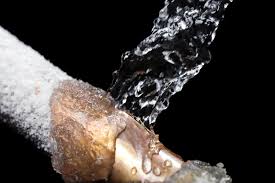In Maine winters, water pipes and other plumbing fixtures can freeze, causing water damage and inconvenience.

Our Greater Portland, Maine insurance agency fielded calls from clients this week due to the extreme cold weather. They wanted to know if Maine homeowners insurance covers damage from frozen pipes.
We also heard from owners of investment property, wondering whether their Maine landlord insurance covers this kind of damage.
In general, the plumber’s repair bill is not covered by these policies, but the water damage caused by frozen or burst pipes is.
Sometimes, clients call us when they discover the pipes are frozen, wondering what to do next. If you’re in that situation, here are some immediate tips:
How to Tell if Your Pipes are Frozen
- When fully open, your faucet only trickles water, then stops completely.
- You hear banging noises from inside walls or crawl spaces.
- You see water staining on a ceiling or wall.
How to Thaw Frozen Pipes
We recommend calling a plumber. However, if you want to attempt to fix the situation yourself, follow these steps:
- Leave the faucet that is not working open (hot and cold).
- Turn off the main water supply.
- Locate the frozen pipe by opening other fixtures closer to the main water supply. The frozen section will be between the last working fixture and the first non-working one.
- The frozen section will probably be near a crawl space or outside wall.
- Feel the pipe, looking for a section that is very cold. There may even be frost or ice on the outside of the pipe.
- Warm the frozen section GENTLY, using a hair dryer.
- NEVER use a flame or torch. Heating the pipe too suddenly can weaken it and cause it to burst.
- Work from the open fixture back to the frozen area. This keeps steam from being trapped by ice, which can burst the pipe.
- You should notice water trickling from the open fixture as the ice melts.
- Once all the ice is melted, close the fixture and open the main water supply.
- Make sure there are no leaks anywhere along the pipe.
How to Prevent Frozen Pipes
Before Cold Weather Hits:
- Insulate exposed pipes located near exterior walls and crawl spaces with foil, then enclose with foam sleeve insulation.
- Close and drain sillcocks (fixtures that pierce the sill of your home, usually a garden hose connection).
- Learn where your main water shutoff is. Show everyone in your household how to close the valve.
During Extreme Cold Weather:
- Open faucets (both hot and cold) enough to keep a trickle of water going.
- Open under-sink cabinets against outside walls to allow warm air into the plumbing underneath.
- Keep your home thermostat to at least 55 degrees.
We hope you never suffer frozen pipes. If you do, we hope this information is helpful. If you live in the Portland Maine area and have questions about home insurance, insuring income property, or condominium and apartment insurance, contact a Noyes Hall & Allen agent at 207-799-5541.

